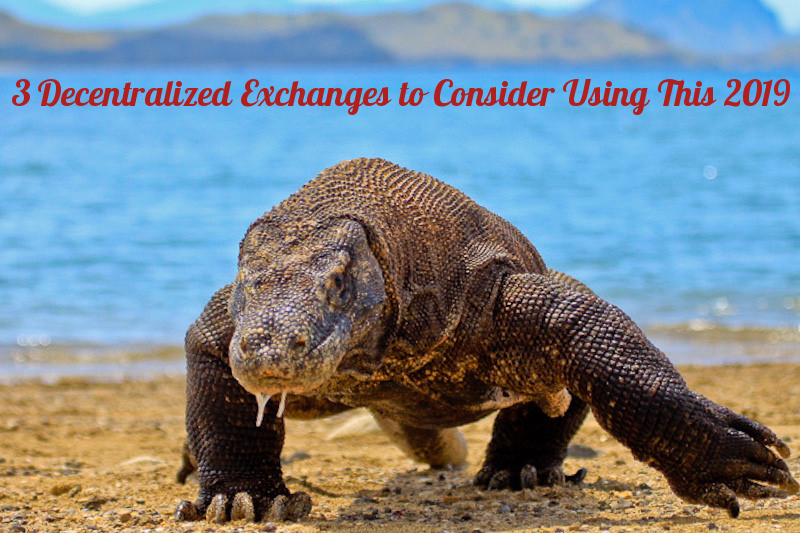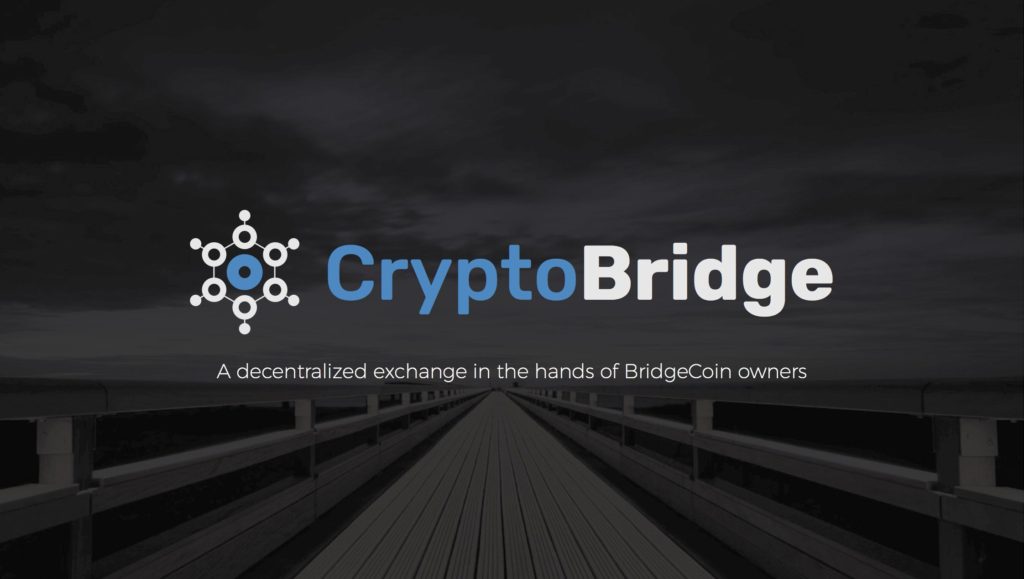
3 Decentralized Exchanges to Consider Using This 2019
With the rise of cryptocurrency exchange hacks and failures over the last few years, the blockchain community has sought out and demanded a safe haven for transacting online. Cue decentralized exchanges (DEXs), an answer to the all-too-present security and reliability flaws associated with traditional cryptocurrency exchanges.
With the rise of cryptocurrency exchange hacks and failures over the last few years, the blockchain community has sought out and demanded a safe haven for transacting online. Cue decentralized exchanges (DEXs), an answer to the all-too-present security and reliability flaws associated with traditional cryptocurrency exchanges.
And, with 2019 already starting off on a rough note, thanks to the estimated $16 million Ethereum and ERC20 token hack of New Zealand-based cryptocurrency trading exchange ‘Cryptopia’, it might be time to actually start migrating over and diversifying your exchange use and trading.
For those unfamiliar with decentralized exchanges, let’s go through a quick explanation.
Table of Contents
What are Decentralized Exchanges?
Simply put, decentralized exchanges are crypto exchanges which operate in a decentralized and trustless manner, meaning unlike traditional crypto exchanges, they do not answer to single centralized entity. Instead decentralized exchanges enable the peer-to-peer (P2P) trading of cryptocurrencies. Decentralized exchanges also provide users and traders with comfort of 24/7 up-time, due to other nodes in the network picking up slack should others go offline.
Centralized exchanges are viewed as a “honeypot” for malicious hackers, as everything – from someone’s name and photograph, to location, all the way to highly-sensitive personal and financial information – is at the hands of a centralized mechanism. That’s right. There’s potential for “everything to fall” should hackers gain access to a centralized system. DEXs on the other hand, enable users to anonymously transact and trade, as KYC is generally not required.
Decentralized exchange omittance of a centralized third-party and middleman is made possible by smart contracts, which govern the execution of transactions, transmittance of information, and ultimately power the network and its functions. Such architecture also allows for decreased trading fees, as costly middlemen and intermediaries no longer need to be accounted for. While DEXs do appeal to those seeking out anonymity, reliability, and choice of less mainstream projects (they are a hotspot for altcoins due to low listing fees), they do unfortunately suffer from several issues, such as:
- No direct fiat purchases or deposits,
- Lower liquidity and trade volume,
- Network latency and slower transaction times,
- Limited or non-existent interactions between different blockchains.
Simply put, you can think of decentralized exchanges as mechanisms which connect traders with other traders, while centralized exchanges are mechanisms which connect traders to a particular entity.
Now, let’s turn to three decentralized exchanges you should consider using this 2019.
IDEX.Market: Real-Time & High Throughput ETH Exchange

IDEX is a hybrid, semi-decentralized cryptocurrency trading exchange enabling for real-time, trustless, and high-throughput trading in tandem with blockchain-based settlement. Most notably, IDEX is the first Ethereum-based DEX to support real-time trading, supporting both market and limit orders, gas-free cancellations, and heightened ability to fill orders.
As we noted above, IDEX is actually a hybrid decentralized exchange, meaning it centralizes the non-critical components of the exchange trading process and maintains control of the broadcasting of transactions to the network. Rest assured though that deposits, trades, and other transactions are specifically authorized by end users and their private keys.
IDEX addresses addresses most challenges faced by current decentralized exchanges in four core ways:
- Order Competition: IDEX assigns competition rights for order filling to a single relayer, which prevents “race conditions” (where traders experienced “bad jump destination and wasted gas costs) and properly coordinates them.
- Gas Fees for Order Cancellations: A general rule for DEXs is that all cancelled orders must subsequently be invalidated on the blockchain (to prevent the collection of old, less than stellar-priced orders at a later date – each cancellation costs gas. IDEX enables users to invalidate ALL past orders in a single transaction, at low-cost.
- Market Maker Non-Compliance: IDEX requires users to first deposit to a contract before trading, and cannot withdraw from it until every transaction has cleared. This helps eliminate the potential for attacks related to revoking orders which have been dispatched.
- Ethereum Backlogs: Centralized exchanges have conditioned crypto exchange users to demand speed. On IDEX, users no longer need to worry about previous transactions needing to mine before submitting a second order. IDEX traders and user experience is insulated from long settlement times, with instantaneous updating balances, and the correct broadcast of sequences for final settlement.
IDEX’s hybrid decentralized architecture helps remedy traditional speed and user experience issues associated with most DEXs, while ensuring for top-notch auditability and security. Note that like most decentralized exchanges, IDEX does not accept deposit methods other than by cryptocurrency transfer, so keep in mind that you’ll first have to purchase crypto on another exchange and subsequently deposit on IDEX.
To get started trading on IDEX, head on over to their website and brush up on their white paper. They also boast a comprehensive FAQ, along with guides for those with outstanding questions.
BarterDEX: Unleash the Atomic Swap Dragon

At the heart of the Komodo Platform’s ecosystem for end-to-end blockchain solutions is BarterDEX, an atomic-swap powered decentralized exchange sanctioning users to trade cryptocurrencies without counterparty risk. BarterDEX is a open-source and boasts trading for literally any coin that a developer chooses to connect to it. And, if you’re wondering what atomic swaps are, don’t worry! Let’s take a look.
An atomic swap refers to the P2P exchange of cryptocurrencies without the need of a facilitating third-party. Atomic swaps are trustless (users never actually give up their private keys at any point), with the term ‘atomic’ merely means the transaction happens completely, or not at all. BarterDEX notes that the atomic swap consists up to 7 transactions, and in some cases, even less than that:
- OC sends the dexfee,
- BGP sends the BGPdeposit,
- OC sends OCpayment,
- BGP sends BGPpayment,
- OC spends the BGPpayment,
- BGP spends the OCpayment,
- BGP refunds his own deposit.
You can read up further about the atomic swap process over at Komodo’s blog.
What’s so attractive about atomic swaps is that they allow you to trade between a greater variety of tokens and altcoins. Note that Komodo’s BarterDEX supports direct trading pairs between 95% of all cryptocurrencies in existence, and has successfully bridged the gap between Ethereum-based tokens (ERC20) and Bitcoin-protocol-based tokens (remember that IDEX only supports Ethereum-based assets and tokens).
Simply put, BarterDEX is a monumental leap for a truly interoperable blockchain ecosystem – as unfortunately at the moment, it’s extremely fragmented. And, for users looking to remain private, BarterDEX incorporates an accompanying technology known as ‘Jumblr’ to hide IP addresses.
Finally, as we noted above, DEXs often suffer from liquidity issues, a problem solved via BarterDEX’s ‘Liquidity Provider Nodes’ (LP nodes) – market makers who ultimately profit from the spread between bid and ask orders.
You can read up further about Komodo and BarterDEX by heading over to Komodo’s website and checking out their white paper. We also recommend heading over to the KomodoPlatform/BarterDEX GitHub for a more comprehensive explanation of atomic swaps.
CryptoBridge: In the Hands of BridgeCoin Holders

Founded in 2017, and a relative newcomer in today’s decentralized exchange space, CryptoBridge is a decentralized cryptocurrency exchange built on top of the BitShares platform (BTS). Notably, CryptoBridge touts itself as “In the hands of BridgeCoin Holders,” as its native token ‘BridgeCoin’ (BCO) authorizes a 50% revenue share for BCO holders along with token staking.
Bridgecoin is a scrypt mineable coin, similar to Litecoin, which was created to fund the development of the CryptoBridge exchange (they opted against going the ICO route). Such token ultimately incentivizes network and platform activity and loyalty, an important step for user retention in today’s market.
CryptoBridge supports trading of some of the most popular altcoins out there, eliminating a single point of favor via their decentralized architecture and multi-signature federated gateway software (which operates across several continents). Notably, the blockchain behind the CryptoBridge DEX is able to process up to 100,000 transactions per second, with an estimated average confirmation time of merely 3 seconds.
Additionally, CryptoBrige has been working with DEXBot to expand exchange functionality and liquidity for 25 of their trading pairs. Such strategy is estimated to produce a least an extra 50-100 BTC in trading volume per month. Mix in a “market maker program” whereby makers are reimbursed for the trading fee and given 50% off the market taker’s trading fee, and CryptoBridge is an attractive option for traders worried about DEX liquidity.
To read up more on CryptoBridge and to see what altcoins and cryptos are offered on it, head on over to their website.
Final Thoughts
This post is only meant as an introduction to DEXs, and does not cover all of them in today’s crypto-sphere, so we recommend conducting your own research while taking this post as a starting point for popular decentralized exchanges out there. Some other popular DEXs in today’s crypto exchange trading space include:
- Stellar DEX,
- Waves DEX,
- 0x (formerly ‘0x Protocol’), and
- Bancor.
In a saturated and difficult to navigate cryptocurrency exchange landscape, it can be an overwhelming process trying to determine which type of crypto exchange best suits your needs. So, if you’re an experienced trader and looking for a safe option to transact and trade altcoins, consider switching over to a DEX. Furthermore, if you’re a novice trader and looking to diversify your cryptocurrency exchange use (or dive into the wild world of trading), purchase some crypto on Coinbase or CEX.io, send it to a DEX, and get trading!
Finally, if you’re interested in reading further about DEXs, check out our past article tackling Binance’s upcoming entry into the DEX market!